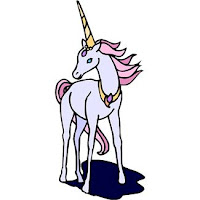I've always been something of a fan of quizzes and
personality tests. When I step back and think about it, my fascination isn't
entirely logical – I mean, I do spend more time in my own head than anyone else does.
But in any case, its fun to find patterns in my own thoughts
that I might not have previously recognized. Of course, most quizzes are pretty
silly – like What Color is Your Aura? Or Which Harry Potter Character Are You?
(which is pointless, because the multiple choice answers are so obvious that
it's not really hard to figure who you're going to get).
On the complete opposite end of the spectrum of usefulness
is something called the Enneagram. It's made up of nine main personality types,
each of which has a wing, or subtype. It also describes how your personality
can change if you're healthy or if you're troubled.
Look, here's a picture. The arrows show the directions of integration and disintegration.
It apparently has some sort of Greek or Babylonian origin,
which I'm guessing means that, thousands of years ago, stone tablet quizzes were
very popular, with subjects like "Which Greek Philosopher are You?"
or "Which Invading Hoard Will Ransack Your Town This Year?"
Anyway, properly explaining the whole thing would take forever. There's also, for example, the triads: thinking, feeling and intuition.
Here is the website if you want more detail.
Anyway… I'm kind of in love with the Enneagram. Because the
description of my personality type is somewhat alarmingly accurate. I mean,
when I first took the quiz, it was like the internet could read my mind.
Here are some descriptors of my personality type, from the
book The Wisdom of the Enneagram (p.
179)
-I often feel alone and lonely, even when I'm around people
I'm close to (check)
-I can forgive almost everything except bad taste (check - this one made me laugh, because it's silly of me, but so true!)
-I tend to brood over my negative feelings for a long time
before getting free of them (check)
-I tend to spend quite a bit of time imagining scenes and
conversations that haven't necessarily happened (CHECK CHECK CHECK)
But I didn't bring this up to talk about my own psyche.
Another big part of the Enneagram that I like is its insights into other types
of personalities. I see it as a tool to explore other ways of thinking and
other approaches to the world - for that ever difficult character development.
For example, when I first come up with a character, and I've
spent time developing their history and characteristics, I go look at the quiz
on the Enneagram site. The quiz, which is used to determine personality type,
presents a series of questions and asks you to chose which of two choices fits you best.
There are the obvious ones:
1. I have tended to
a. Take on confrontations
b. avoid confrontations
But then there are ones that are less intuitive:
2. When I have a new experience, I ask if it will be:
a. Useful to me
b. enjoyable
3. I have been more:
a. relationship oriented than goal oriented
b. goal oriented rather than relationship oriented.
4. I've typically been interested in
a. Asking the tough questions and maintaining my
independence
b. Maintaining my stability and peace of mind
In relation to character development, my very favorite part about the Enneagram though is their
list of basic fears and desires for each personality type. It wasn't something that I really thought about before, and yet these things are at the heart of everyone's personality. So now it's something I ask myself about my characters.
What do they really want? What do they fear most in life?
Basic Fears (The
Wisdom of the Enneagram , p. 32)
Type 1: fear of being bad, corrupt, evil or defective
Type 2: fear of being unworthy of being loved
Type 3: fear of being worthless or without inherent value
Type 4: fear of being without identity or personal
significance
Type 5: fear of being useless, incapable or incompetent
Type 6: fear of being without support or guidance
Type 7: fear of being deprived or trapped in pain
Type 8: fear of being harmed or controlled by others
Type 9: fear of loss of connection, of fragmentation
Basic desires (and their distortions) (The
Wisdom of the Enneagram , p.33)
Type 1: the desire to have integrity (deteriorates into
critical perfectionism)
Type 2: the desire to be loved (deteriorates into the need
to be needed)
Type 3: the desire to be valuable (deteriorates into chasing
after success)
Type 4: the desire to be oneself (deteriorates into self
indulgence)
Type 5: the desire to be competent (deteriorates into
useless specialization)
Type 6: the desire to be secure (deteriorates into an
attachment to beliefs)
Type 7: the desire to be happy (deteriorates into frenetic
escapism)
Type 8: the desire to protect oneself (deteriorates into
constant fighting)
Type 9: the desire to be at peace (deteriorates into stubborn
neglectfulness)
If you're interested in taking the quiz for you, or for your
characters, copy and paste this link into your browser (it won't hotlink, not sure why):
http://www.enneagraminstitute.com/dis_sample_36.asp . If you take it for yourself, you'll know you
answered the questions right if you come up with a description that is
alarmingly accurate.
J
If not, try one of your secondary results.
Let me know what you get if you take the quiz, or if not,
what basic fears/desires seem to most match you or your characters.
(And if anyone is wondering, I'm a Type Four with a Five wing).





























